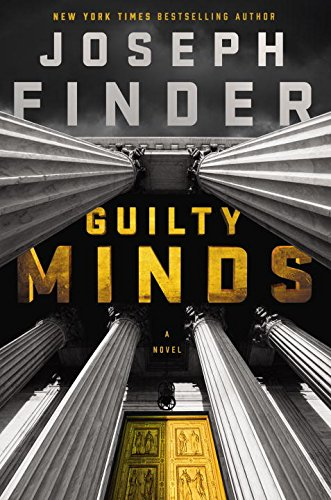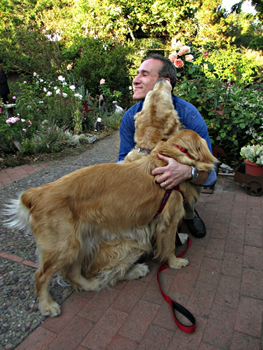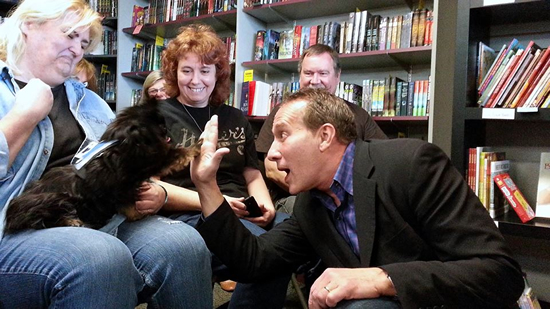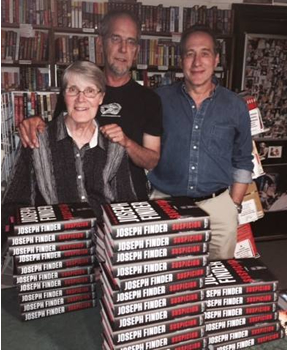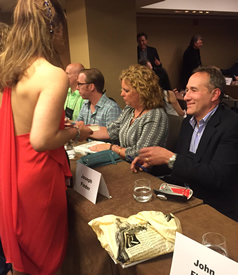Between the Lines: Joseph Finder
Building the Perfect Hero
Joseph Finder writes high-octane bestselling novels of suspense, conspiracy, and ruthless corporations. His books have garnered top industry awards including the ITW Award for Best Novel (Killer Instinct 2006), both the Barry and Gumshoe Awards for Best Thriller (Company Man 2005), and the Strand Critics Award for Best Novel (Buried Secrets 2011). Two of his standalone thrillers, High Crimes and Paranoia, have been made into major motion pictures.
Following up on last year’s standalone New York Times bestseller, The Fixer, Finder is back this month with GUILTY MINDS. Featuring the bruising and brilliant “private spy” Nick Heller, GUILTY MINDS is the third novel in this popular series (after Vanished and Buried Secrets). This time, Heller is hired to stop a salacious story about the chief justice of the Supreme Court and a call girl. But that’s just the beginning of this thrilling ride.
I had the chance to talk to Joseph Finder about GUILTY MINDS, his writing career, and what makes his protagonist, Nick Heller, tick.
Nick Heller is a tough guy. But he’s also very smart and cultured. He knows art better than most, he’s a jazz snob, and of course he’s a human lie detector. What else can you tell us about his history?
Nick’s an unusual guy. He was born into great wealth–his father, the odious Victor Heller, was the Dark Prince of Wall Street–and then lived in poverty after his father was imprisoned for securities fraud. So he’s equally comfortable around rich people and the blue collar. He knows the world of high finance and is not intimidated by swaggering displays of great wealth; in fact, he’s deeply cynical about it. He went to Yale and worked for a few summers at McKinsey, the consulting firm, but then he rebelled by doing the unthinkable—dropping out and enlisting in the army, where he did a few tours in the Special Forces in Iraq and Afghanistan and other places, and then went into intelligence work for the Defense Department.
The idea for Nick Heller was born when I heard about how thousands of CIA officers were laid off, or took early retirement, and went private. I thought: now that’s interesting. That’s different. A spy who’s gone private. That could be cool. He can go anywhere, including foreign countries, and won’t be limited to working in his home city of Boston. He’s not himself a techie, but he’s also not totally ignorant of computers and such. He knows how to do email, which may be the limit of his technical knowledge, but he can understand it when Dorothy, his forensic tech, explains stuff to him.
I had the luxury of creating Nick Heller after I’d written literally millions of words. He didn’t appear until my ninth novel. I’d come far enough along in my writing career that I knew, instinctively, what would work and what wouldn’t. I knew he was going to be a character I wanted to take on a long ride with me—so he had to work as a series hero. A good series character has to be an investigator, some species of detective, if only on the side. But Nick isn’t really a private investigator. He does private intelligence work—in other words, he does the same sort of stuff he used to do for the government, only for the private sector — individuals, politicians, corporations.
I thought of what Raymond Chandler once said, talking about his character, Philip Marlowe: “The private detective of fiction is a fantastic creation who acts and speaks like a real man. He can be completely realistic in every sense but one, that one sense being that in life as we know it such a man would not be a private detective.” And I thought, well, let’s do it differently — let’s make this character tough, but fallible and imperfect, and as real as possible.
I stole his first name from the protagonist of Company Man and his last name from the protagonist of High Crimes, a deliberate borrowing. And of course I’d read plenty of thriller series. I was particularly fond of a few series heroes: John Sandford’s Lucas Davenport, Lee Child’s Jack Reacher, Bob Parker’s Spencer, and John D. MacDonald’s Travis McGee. All four of them are men of action who are also intensely cerebral, almost intellectual. You can see some ways in which those four influenced Nick Heller. Though he’s plenty different too. He’s quick-witted and usually comes up with the perfect comeback in conversation, but just as often he thinks the perfect comeback and says something less sardonic and inappropriate.
Nick alludes to some dark secrets in his past. How much can you tell us about his experiences in the special forces in Afghanistan and Iraq?
Not much beyond what I’ve just said. His military past comes out in dribs and drabs, usually when he calls upon one of his old comrades for help. I deliberately keep his background sketchy. There are a few traumatic incidents that he never talks about — but which he’ll have to reveal in future stories. I don’t even know what they are yet. When the time comes, I’ll figure them out.
There’s a new book by Sebastian Junger called Tribe that made me think of Nick Heller. Junger’s take is that we all instinctively want to belong to small groups, or tribes, and that this connection has disappeared from contemporary society. Where it still exists is in the military, which is why leaving the military and returning home is so difficult for so many people. They’re forced to give up a way of existing that’s given their lives meaning. Heller, as I see it, was powerfully affected by his service in the military, especially his Special Forces detachment, where he made some of his most lasting and genuine friendships.
And then there’s Nick’s family. Not exactly his tribe? Or a Norman Rockwell painting, for that matter. Can you talk a little about Nick’s relationship—past and present—with his father, Victor Heller?
Victor Heller is a brilliant, reptilian character who always seems one step ahead of Nick. He’s in prison, doing a 28-year sentence. Nick hates the man but harbors a sneaking admiration for him. Victor lies as easily as he breathes. In each Heller book, so far, Nick has gone out of his way to visit his father in prison in upstate New York —not out of a sense of filial duty but to get information or advice. Victor, the evil genius, has somehow remained plugged into the outside world, and he always knows a lot, far more than he lets on.
And his brother, Roger?
Roger was his father’s favorite son, largely because he takes after Victor.
Nick and Roger were close growing up, in the great mansion in Bedford, New York, and Nick was Roger’s protector. But they parted ways after their father went on the lam, and when Victor was finally caught and imprisoned. Roger became their father’s defender, while Nick saw his father for what he was — a corrupt, arrogant sociopath. Roger followed Victor’s path, not only in finance but also in crime . . . and beyond that I don’t want to say anything, because Roger’s story is the mystery at the center of the first Nick Heller book, Vanished.
Vanished is a great book, by the way. Nick is protective of his brother’s stepson, Gabe. It gives a soft touch to Nick’s otherwise tough-guy veneer. Almost fatherly in his affection. Is Nick the type who will never marry? Never have kids?
I doubt Nick’s going to marry. He says, “Marriage is great — it’s just not in my skill set.” I don’t see the Heller books as a soap opera, and I don’t want to have Nick tied down to one woman. He’s serially monogamous. I also want to avoid having Nick change in any significant way from book to book. Nick may learn things about his background, as the books go along, but he’s not going to get married and have kids. It’s important, I think, that he remain somewhat detached from the world, a wry observer who’s also available to women. He loves women, and in fact his closest friends are women. But I don’t want to commit him, romantically, to just one.
Gabe has aged a bit in the Heller books so far, but he remains a teenager. And a misfit. He’s a talented artist who draws and writes graphic novels and who, despite his teenage cynicism, hero-worships Nick. Gabe is an odd duck, but he’s the closest Nick’s going to come to having a child of his own. He’s turned out to be an important character: he shows a side of Nick, a nurturing, parental side, that otherwise wouldn’t come out.
You write terrific action scenes in all your books. One thing I find very entertaining is the fights. Despite being 6’4″, Nick always manages to find an opponent even bigger than himself to tangle with. No Marquess of Queensberry rules here. How do you choreograph your fight scenes, and is it fun?
Thanks. I love writing the fight scenes. They’re not as central to the stories as, say, Reacher’s are in Lee Child’s books, but they’re important. Because Nick is a cerebral character who also happens to be a badass. He never fights unless attacked first. He never starts it. He’s also not a brawler. I loved the action sequences in the Bourne movies, the way Bourne improvises weapons — a towel, a hardcover book, an electrical cord, a pen, a rolled-up magazine — so Nick does some of that. And yes, he doesn’t observe the Marquess of Queensberry rules at all. If he fights with someone trained as a boxer, he’ll deliberately use a street fighter’s technique. He’ll happily fight dirty.
I actually get help from a few self-defense experts, including one who trains the U.S. Marines in the Japanese martial art Bujinkan. Occasionally he’ll record a video of a demonstration fight to help me choreograph the fight scenes, keeping them interesting and fresh.
Nick accomplishes his tasks with tremendous speed and efficiency. Part of that is because he often rushes in where wise men fear to tread. Can you talk about his self-confidence and what effect that has on the pacing of your stories?
Nick’s Special Forces training taught him to focus with laser-like determination on the goal, without allowing himself to be distracted or deterred. He applies that same focus to the jobs he takes on: once he identifies the goal, he’s not going to stop until he reaches it. That focus becomes the major plot engine of GUILTY MINDS, because Nick continues his hunt even after his client tells him to stop. He doesn’t have the answer yet, so he’s not done.
Nick Heller makes great use of experts to achieve some of his results. There’s Dorothy, Art Garvin, various shady characters, even his convict of a father. These relationships lend credibility to your books, since Nick doesn’t have to be an expert on all subjects. But even if your hero isn’t up to date on all the latest hacking and surveillance technologies, you the writer have to be. How do you keep up with the latest developments?
Nick’s world is the real world, not a cartoon landscape. It’s a world of texting and Facebook and email, a place where the explosion of technology affects everyone and everything. Sometimes I see the Heller books as being a literary equivalent of the Bourne movies or the TV series Homeland—the technology should be real, and it should be cool. So I have a virtual Rolodex (not literally, anymore) of experts on call — hackers, forensic techs, experts in everything from money laundering to surveillance to acoustic science to lock-picking. I suppose I could make it all up — that’s why they call it fiction — but it’s more fun to find out about it and tell my readers about it — to get it right. But as the old saw goes, research should be like an iceberg: you see no more than ten percent of it. Meaning that I need to understand the technology just enough to convey it simply and clearly. Without showing off how much I know.
And that leads me to research in general and your locations in particular. For example, in GUILTY MINDS there’s Ellen Wiley’s horse farm or her pied-à-terre in Georgetown. (She’s a wonderful character, by the way.) Do you visit all the places you describe in your books? Do you ever just invent locations?
I invent locations plenty of times. When I’m writing about a real place, whether it’s Boston or Washington, D.C., I like to get it right, or as right as is reasonable. But I don’t always have the time to do location research, not on a book-a-year schedule, so at times I just make it up. Or I rely on Google. Ellen Wiley’s horse farm is based on a real place (some might recognize that it’s sort of like Bunny Mellon’s estate), but I didn’t have time to take a visit, so I extrapolated from online sources — of which there are plenty.
I always ask writers about their writing process. Tell us about yours.
My books always start with a what-if premise, the kernel of the story, the thing that intrigues me. Then begins the brainstorming, and shortly after that I start doing research (some books more than others). Research is part of the brainstorming process for me. I love it. I love finding out how things work, what people do all day. It’s like crack to me, though, so I have to cut it short before it threatens to take over.
So now we come to the great debate among novelists: outline or not? Well, I’ve tried it both ways, and I’ve settled at a point somewhere in the middle. I wrote one book (Power Play) without any outline, and I ended up wasting a couple of months on story lines that didn’t work in the final manuscript and had to be scrapped. I also wrote, or tried to write, one book for which I did an extensive, 150-page outline, and I couldn’t do it. It was too boring. I can’t work that way. It was like working on a factory assembly line.
What I’ve settled on is a sort of bare-bones, rudimentary outline — sort of like what screenwriters call a “beat sheet.” The major plot points and some of the minor ones. I don’t start writing until I have that worked out. But I leave myself open to changing the story as I go along, if I have a better idea. Which I often do. So that often the final manuscript is radically different from the beat sheet I started out with.
I also write in an extremely linear manner. I experience the story in the way the reader will read it.
My main writing session takes place in the morning. I go to my office, which is a few blocks from where we live in Boston, turn on the espresso machine, and drink a succession of espressos as I write.
What’s interesting, and also a little frustrating, about having done this for a long time is that it doesn’t get any easier. In some ways, it’s harder, because your critical faculties have gotten more acute. You’re a tougher judge of the product. The more you write, the more you read, the higher your standards.
I also go through periods when I hate whatever I’m working on – I think it’s total crap. Usually I come around. But not always.
Another thing readers are interested in is that moment when you made your first sale. Tell us about that.
You never forget your first sale. I’d just gotten home from teaching and found a voice message from my foreign-rights agent telling me that he’d sold my first novel, The Moscow Club, to Pan, in the UK. A sale to the UK—before a US deal. For more money than I made in an entire year of teaching. It wasn’t long after that that my agent sold the US rights for a lot of money, and then I marched right in to my boss’s office and I quit my teaching job, effective the end of the semester. That was more than 25 years ago, and I haven’t had a real job since.
You’re fresh off a couple of standalones. Now you’re back with Nick Heller. What’s next for Joseph Finder?
Going back to Nick Heller after several books away from him (Suspicion, The Fixer) was an immense pleasure. It was like putting on your favorite old jeans. Or a broken-in pair of really comfortable shoes. The voice was right there, waiting for me, as were his “family”— including Dorothy, his tech whiz, and Gabe, his brilliant, awkward teenage nephew. But the next novel is another standalone, because I came up with a really good idea that would only work as a one-off. That’s what I’m immersed in now. The plan right now is to alternate standalones with Nick Hellers. But after this, I reserve the right to stick with Heller novels all the way. They’re too much fun to write.
- LAST GIRL MISSING with K.L. Murphy - July 25, 2024
- CHILD OF DUST with Yigal Zur - July 25, 2024
- THE RAVENWOOD CONSPIRACY with Michael Siverling - July 19, 2024

